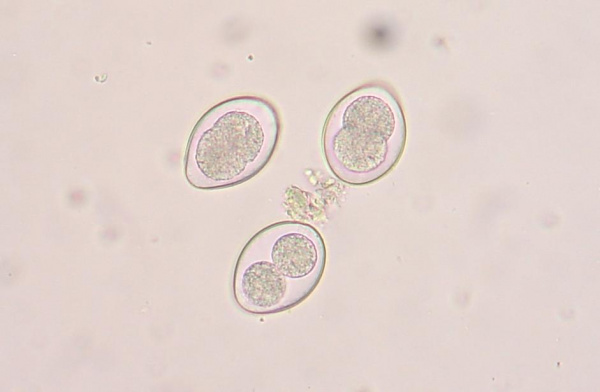Coccidiosis in Dogs
What is coccidiosis?
Coccidiosis is an intestinal tract infection caused by a single-celled organism (a protozoa) called coccidia. Coccidia are sub-classified into a number of genera (groups), and each genus (group) has a number of species.
Image via Wikimedia Commons/Joel Mills (CC BY-SA 3.0.)
"At least four different genera of coccidia can infect dogs."
Coccidiosis typically refers to gastrointestinal infections with Isospora species of coccidia. At least four different genera of coccidia can infect dogs: Isospora canis, I. ohioensis, I. neorivolta, and I. burrowsi.
These microscopic parasites spend part of their life cycle in the lining cells of the intestine. Despite damaging these cells, most infections in dogs are not associated with any detectable clinical signs. Infections without clinical signs are called sub-clinical infections. The species that most commonly causes clinical infections in dogs is I. canis, but Cryptosporidium parvum (another coccidian parasite) can as well, especially in puppies.
How did my dog become infected with coccidia?
Your dog most likely became infected with coccidia from swallowing oocysts (immature coccidia) that are found in dog feces and soil contaminated with feces. Infected dogs pass oocysts in the feces. These oocysts are very resistant to a wide variety of environmental conditions and can survive for some time on the ground. Under the right conditions of temperature and humidity, these oocysts 'sporulate' or become infective. If a susceptible dog ingests the sporulated oocysts, the oocysts will release 'sporozoites' that invade the intestinal lining cells and set up a cycle of infection in neighboring cells. Dogs may also become infected indirectly by eating a mouse that is infected with coccidia.

What kinds of problems are caused by coccidiosis?
The most common clinical sign of coccidiosis is diarrhea, but most dogs that are infected with coccidia do not have any clinical signs. When the coccidial oocysts are found in the stool of a dog without diarrhea, they are generally considered a transient, insignificant finding.
"In puppies and debilitated adult dogs, coccidiosis may cause severe watery diarrhea, dehydration, abdominal distress, and vomiting."
However, in puppies and debilitated adult dogs, coccidiosis may cause severe watery diarrhea, dehydration, abdominal distress, and vomiting. In severe cases, death may occur.
How is coccidiosis diagnosed?
Coccidiosis is usually diagnosed by performing a fecal flotation test to look for oocysts under the microscope. Since the oocysts are much smaller than the eggs of intestinal worms, a careful evaluation must be made. Detection is made easier when a zinc sulfate flotation solution is used. Infection with some of the less common coccidial parasites may be diagnosed with a blood test.
How is coccidiosis treated?
Your veterinarian may prescribe a sulfa-type antibiotic called sulfadimethoxine, which is usually given for 5-25 days. In severe infections, it may be necessary to repeat the treatment. If the diarrhea is severe and your dog is dehydrated, other medications and treatments, such as IV fluids, may be required. If the sulfa-type antibiotic is not effective at clearing the infection, other treatments are available; your veterinarian will discuss these treatments with you. Some dogs may not require much in terms of medical treatment, depending on the severity of the condition.
Reinfection of susceptible dogs is common so environmental disinfection is important. The oocysts are very resistant to environmental conditions and disinfectants. The use of diluted chlorine bleach [one cup (250 ml) of bleach mixed in one gallon (3.8 L) of water] is effective if the surfaces and premises can be safely treated with it. Be sure to test clean a small area of any affected materials since bleach can damage many surfaces. Steam cleaning may also be used to destroy oocysts. Be sure to remove any feces as quickly as possible from the environment to prevent reinfection.
Can the coccidial parasites that my dog has infect me or my family?
The most common species of coccidia in dogs do not have any effect on humans. However, less common species of coccidia can potentially infect humans. One species in particular, called Cryptosporidium, may be transmitted to people. This parasite, which may be carried by dogs and cats, has also been found in the public water supply of some major cities. It poses a health risk for those who are immunosuppressed, such as people with HIV, people taking immune suppressing drugs, cancer patients, and the elderly.
Good hygiene and proper disposal of dog feces are important in minimizing the risk of transmission of all canine parasites to humans or other animals.






